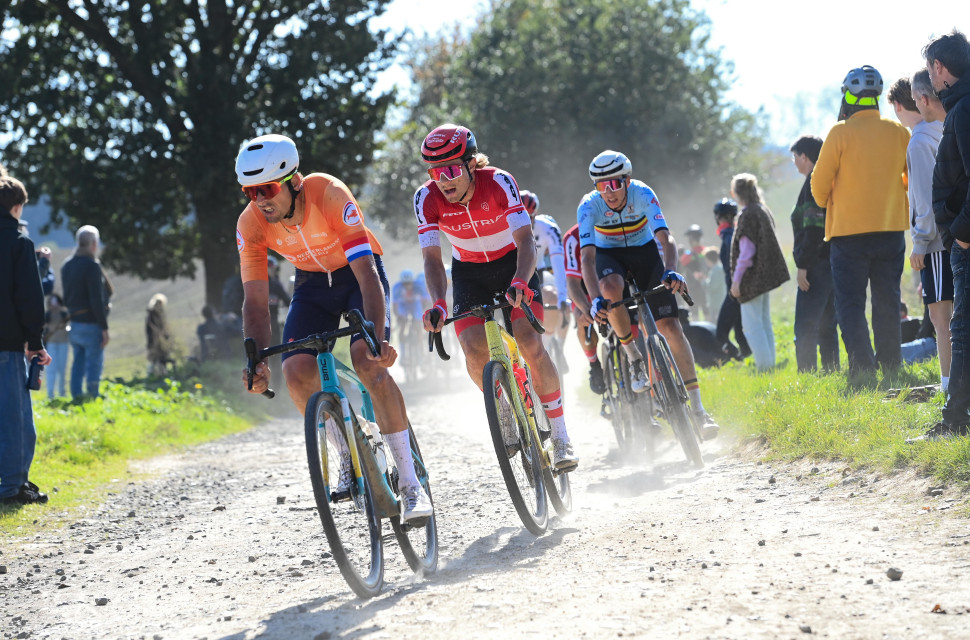UCI Gravel Racing - Positive progress or is it just a trend?

[Words by Jonny Croft]
As Marianne Vos and Mathieu van der Poel claimed victory at the third running of the UCI Elite Gravel World Championships in Leuven, Belgium, questions surfaced about the nature of the course, how "gravel" it really was, and whether the UCI's involvement is genuinely benefiting the sport of cycling or simply an attempt to stay relevant by latching onto the latest trend. With British Cycling largely absent from the conversation and complex laws governing cycle racing in the UK, where does this leave British riders as the gravel scene evolves?
- Future of professional gravel racing
- 2024 UK gravel events - the best off-road races of the year
- Gravel bike racing – everything you need to know
Gravel cycling has its roots in the USA, where rough, ungraded terrain gave rise to specialised bikes and iconic events such as the Belgian Waffle Ride and Unbound (formerly Dirty Kanza). While some argue that the Rough Stuff Fellowship in the UK also contributed to the birth of gravel, it was in the US that gravel-specific bikes, such as Salsa's groundbreaking Warbird (introduced in 2013) first took off. The discipline quickly gained traction, creating professional riders and spawning high-profile races such as the Life Time Grand Prix, which offers a substantial $300,000 prize purse.
As gravel grew in popularity in the US, the sport began to spread globally, with early UK events such as the Dirty Reiver debuting in 2014. Fast forward ten years, and the UCI has established a Gravel World Series and World Championships. However, something crucial seems to be missing from the event pooling – the USA. Despite being the birthplace of gravel, the UCI Gravel World Series features only one US event in 2024, compared to multiple rounds in Belgium, Spain, Germany, Australia, and the UK. Of the 26 events in the series, 20 are in Europe, with no representation in Asia, Central, or South America.
This imbalance perhaps stems from the fact that the UCI's gravel venture is managed by a Belgian-based private sports marketing company whose primary goal is profitability. This European focus mirrors the model used in the dwindling UCI Gran Fondo World Series, with one key difference: pro cyclists don't seem interested in becoming Gran Fondo World Champions.
For those who have taken the time to watch any of the UCI World Championships to date, the events have not captivated the public as I had expected the UCI might hope. The courses appear to diverge significantly from what many would consider true gravel riding, featuring everything from canal path–style tracks to routes dominated by road and tarmac more akin to a Flanders-style classic race. If the races are being won by riders using cyclo-cross tyres - Marianne Vos, for example, utilised 33mm wide Dugast tubular tyres with a self-inflating system - does this indicate that the courses are not technical or rugged enough? Or perhaps Vos would have triumphed regardless of the tyres she chose.
[SWpix]
A significant factor seems to be the influence of television coverage on course design. Adopting a lapped format simplifies filming but also introduces complications, such as riders from different age groups being lapped by each other. There have been personal reports from female riders who have complained about competitors drafting behind male age group riders, which raises concerns about the current rules and the overall race format. These issues suggest that the emphasis on television-friendly layouts may be undermining the integrity and inclusivity of the competition.
Looking ahead, the UCI World Championships will remain heavily Eurocentric with France set to host the 2025 and 2027 editions and Australia scheduled for 2026. The decision to award the 2028 event to Saudi Arabia, however, raises significant questions about how host locations are selected. Is the UCI genuinely focused on expanding gravel cycling globally or is it simply prioritising those willing to pay the most?
This leads to another question... If the United States is considered a stronghold of gravel cycling, where are the American riders? Despite the prominence of the Life Time Grand Prix, none of its top contenders, such as Keegan Swenson or Sofia Gomez Villafane, participated in the UCI World Championships. No American rider has earned a medal in any of the three editions of the event thus far.
It seems gravel racing is diverging into regional styles. The UCI series, for instance, is evolving into something quite different from the Life Time Grand Prix. Another notable contender is the Gravel Earth Series, which offers a more global reach, with events in the USA, Africa, Central and South America, and Europe, including one in the UK.
Each series follows a different championship format. In the UCI series, riders who finish in the top 25% at a qualifier secure a place in the World Championship but they must cover their own entry fees. While riders are given the option to wear their national colours, don't expect any help from British Cycling if you qualify — since they don’t offer an official jersey, you'll have to turn to a third-party provider if you want one.
So where does all this leave British gravel riders? Is it even relevant to the average cyclist? For everyday riders, gravel riding in the UK is thriving, with new tech, plenty of events and thousands of miles of tracks and trails open for exploration, especially in Scotland, where access rights are particularly generous.
However, the situation is more challenging for racers. While the UK’s National rights of way system permits riders to use bridleways, it prohibits racing on them, even if the route is closed to the public—ironically, the opposite is true for footpaths. Existing cycle racing laws are primarily focused on road racing, with little provision for off-road formats like gravel. This means that most races outside Scotland must either be run on lapped courses or incorporate timed sections to avoid the legal complexities involved if an event needs to use or cross a public highway or rights of ways.
Another challenge is the lack of support from British Cycling, which does not officially recognise gravel as a distinct discipline. While British Cycling sanctions road, mountain bike, BMX, track, cyclocross, and cycle speedway events, gravel remains outside their remit. This lack of recognition creates barriers for event organisers, particularly when it comes to securing public liability insurance and adhering to a formal set of rules. Currently, there is no official British Gravel Championship – the title is self-proclaimed and not affiliated with either British Cycling or the UCI.
On a global level, the UCI needs to take a broader perspective and recognise that gravel means different things to different people around the world, not just in Europe. This diversity is part of the sport’s charm and can be reflected in UCI-level courses. However, we urgently need a World Championship in the USA, on a course that represents the riding style everyday gravel cyclists can relate to — not a 37km/h (23mph) average speed lap with a few cobbles thrown in to give it a rougher appearance. The decision to hold the 2028 championship in Saudi Arabia clearly shows that the UCI is choosing venues based on who can pay the most. Unless changes are made quickly, the UCI Gravel World Championships will remain a Europe-centric event, where professional road riders merely swap bikes for a day — or, if the courses continue to be so uninspired, they might not even need to change bikes at all.
We’d love to hear your thoughts on the future of gravel racing and what steps, if any, should be taken next.











